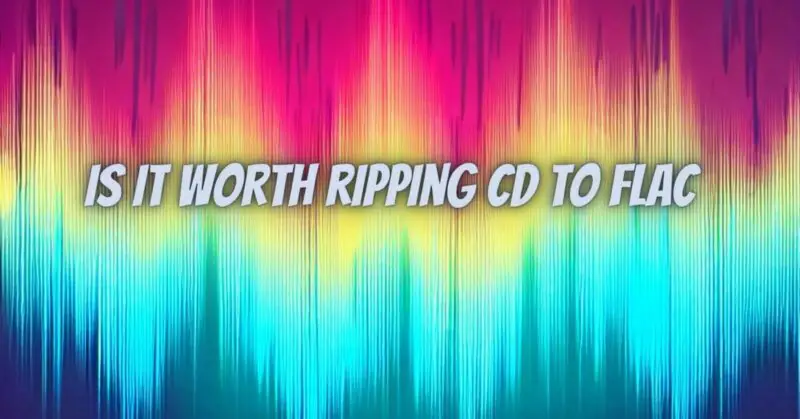With the advent of digital music, physical media like Compact Discs (CDs) has gradually given way to digital formats. For audiophiles and music enthusiasts, the decision to rip CDs to a digital format like Free Lossless Audio Codec (FLAC) is a common dilemma. In this comprehensive article, we will delve into the benefits and considerations of ripping CDs to FLAC to help you decide whether it’s worth the effort.
Understanding FLAC
FLAC, or Free Lossless Audio Codec, is a popular digital audio format known for its lossless compression. Key features of FLAC include:
- Lossless Compression: FLAC uses advanced compression algorithms to reduce audio file sizes without sacrificing audio quality. It retains all the original audio data.
- Bit Depth and Sample Rate Support: FLAC supports various bit depths (e.g., 16, 24, 32 bits per sample) and sample rates, including those higher than CD quality.
- Platform Compatibility: FLAC files can be played on a wide range of devices, including computers, smartphones, and dedicated audio players.
Benefits of Ripping CDs to FLAC
- Preservation of Audio Quality:
- One of the primary benefits of ripping CDs to FLAC is the preservation of audio quality. FLAC files are lossless, ensuring that no audio data is lost during the conversion process.
- Space Efficiency:
- FLAC’s lossless compression allows you to save storage space compared to the original, uncompressed audio files on CDs. This is particularly advantageous if you have a large CD collection.
- Flexible Playback:
- FLAC files can be played on various devices and software platforms, offering flexibility in how you enjoy your music. This includes compatibility with high-resolution audio setups.
- Archiving and Backup:
- Ripping CDs to FLAC provides a digital backup of your music collection, safeguarding it against physical damage or loss. You can easily create redundant copies for added security.
- Metadata and Organization:
- When you rip CDs to FLAC, you have the opportunity to manage and organize your music collection efficiently. You can add metadata, album artwork, and create playlists.
- Customization:
- Ripping CDs to FLAC allows you to customize audio settings according to your preferences, such as bit depth, sample rate, and metadata tags.
Considerations and Challenges
While ripping CDs to FLAC offers several advantages, there are considerations and challenges to keep in mind:
- Time and Effort:
- Ripping a large CD collection to FLAC can be time-consuming, especially if you want to ensure accurate metadata tagging and organization.
- Storage Space:
- While FLAC files are more space-efficient than uncompressed audio, they are still larger than some lossy formats like MP3. Ensure you have sufficient storage capacity.
- Equipment Quality:
- The quality of your CD drive and ripping software can impact the accuracy of the ripping process. High-quality equipment is essential for optimal results.
- Audio Playback Devices:
- Ensure that your preferred audio playback devices support FLAC files, especially if you plan to use high-resolution audio equipment.
- Bit Depth and Sample Rate:
- Be mindful of the bit depth and sample rate settings when ripping CDs to FLAC. Higher settings provide greater detail but result in larger file sizes.
Ripping CDs to FLAC is a worthwhile endeavor for audiophiles and music collectors who prioritize audio quality, preservation, and flexibility. It offers the benefits of lossless compression, space efficiency, flexible playback options, and robust organization capabilities. However, it does require an investment of time and effort, as well as consideration of storage space and equipment quality.
Ultimately, whether it’s worth ripping CDs to FLAC depends on your personal preferences and priorities. If you value pristine audio quality, long-term preservation, and the convenience of digital music management, then ripping your CDs to FLAC is a compelling choice. It allows you to enjoy your music collection in the digital age while retaining the fidelity and authenticity of the original recordings.


